Moshar Machine promising a solution to mosquito menace
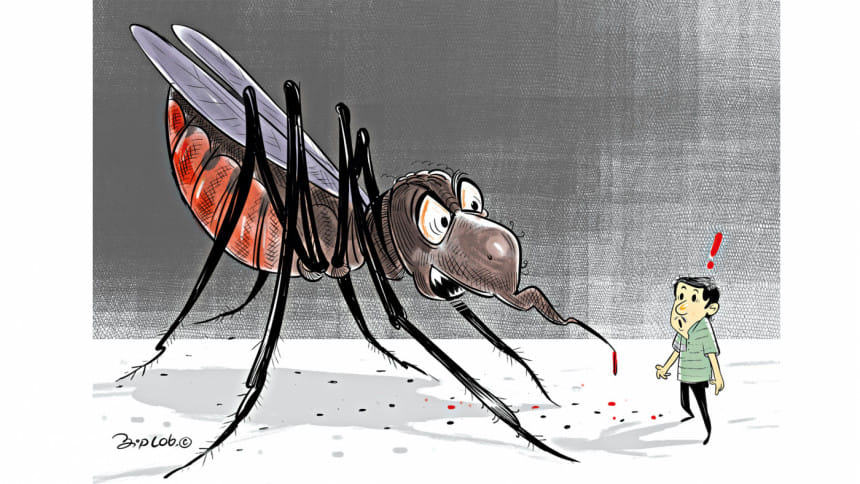
When the entire country is grappling with mosquito menace, a Bangladeshi entrepreneur and his team have come up with an ingenious solution that promises to be an effective tool in mosquito control.
Manufactured entirely in their lab with low-cost, eco-friendly technology, the device, named "Moshar Machine", can trap and kill a large number of mosquitoes if placed at an appropriate location.
Ashiqur Tanim, an Australian-educated entrepreneur, returned to Bangladesh in 2019 to invest in the research and development sector. He set up a lab in Dhaka named THiNK LABs, hired young Bangladeshi engineers and started developing tech-based solutions for a wide range of clients.
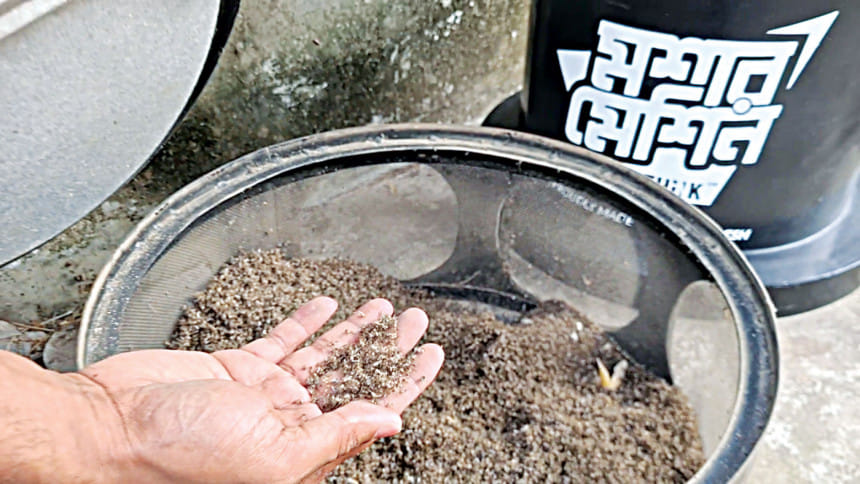
"We designed this metal body to house the device so that it can be deployed in public places. This metal outer cage made this machine extremely durable, requiring simple maintenance like cleaning the nets with a brush."
Tanim's love for technology and his drive to make a difference led him to focus on mosquito-borne diseases like Dengue, which take countless lives each year. He saw this as his chance to contribute meaningfully to the society.
After years of research, Tanim and his team at THiNK LABs developed a mosquito trap based on the formula of existing CO2 mosquito traps. However, unlike the other traps, THiNK LABs' device is of much larger capacity, way cheaper, and eco-friendly. It can also be used as an air disinfectant.
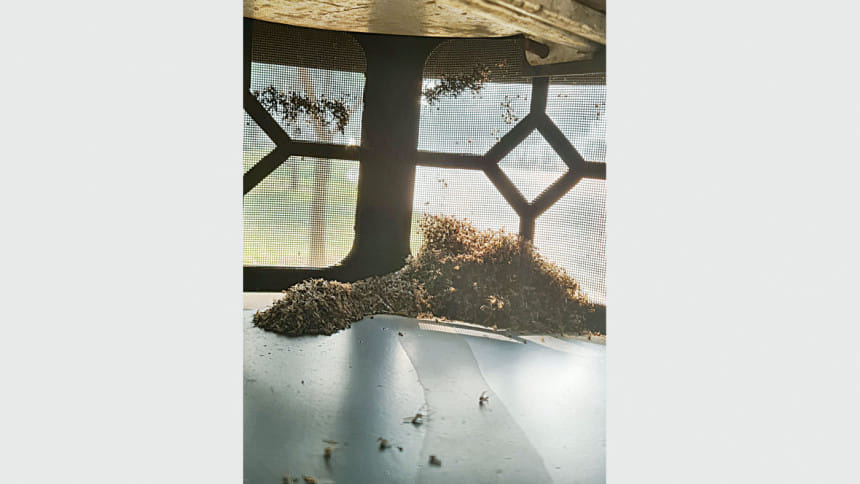
HOW THE DEVICE WORKS
The researchers at THiNK LAB have developed a way to make the device emulate human breathing, a feature that female mosquitoes, which require blood to reproduce, find irresistible.
The "Moshar Machine" device is equipped with a light source that emits light at a particular wavelength which enables it to interact with a special chemical coating within the device. Scientifically, this interaction is called photocatalysis.
This process produces highly reactive superoxide anions and hydroxyl radicals which oxidise organic matter in the air (bacteria, viruses and other organic compounds) and this ultimately leads to the release of trace levels of carbon dioxide that replicates human breathing.
According to Tanim, "Usual CO2 mosquito traps burn fossil fuels such as propane and use other chemicals to mimic human breathing. Users have to refuel the device regularly which is expensive and the fuel and its byproducts may also have some adverse impact on the environment."
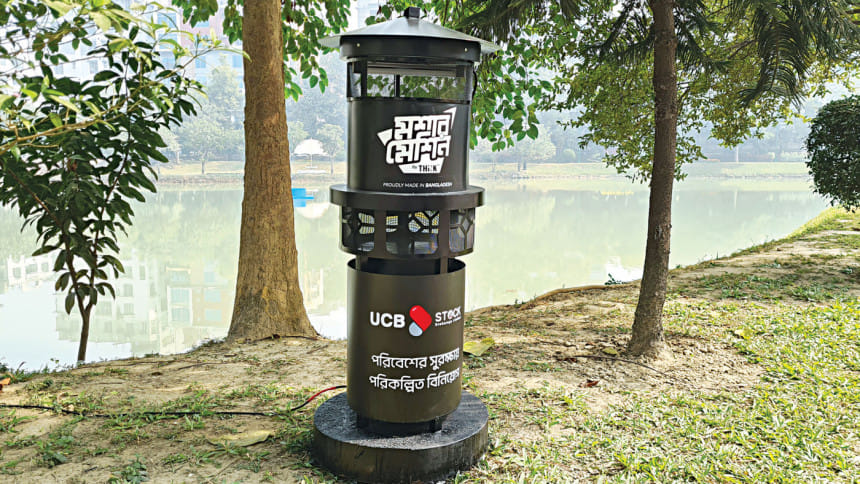
"The Moshar Machine's innovative technology initiates photocatalysis and uses organic compounds in the air to replicate human breathing. So, we don't need any fuel to operate the machine and it does not produce any adverse by-products," states Tanim.
"On the other hand, the process automatically kills harmful bacteria and viruses in the air thus disinfecting it. And, the huge amount of dead mosquitoes this machine produces can be used as high-quality poultry and fish feed," added Tanim.
Once the mosquitoes get attracted to the machine, they are sucked into it through automated flaps and transferred to a cage where they die within two to three hours from dehydration. The flow of dry air produced by a fan fitted inside the machine speeds up the process of dehydration.
The entire setup comes inside a large metal body so that it can be safely used outdoors.
Tanim said, "We designed this metal body to house the device so that it can be deployed in public places. This metal outer cage made this machine extremely durable, requiring simple maintenance like cleaning the nets with a brush. It also enables the device to have a high volume of mosquito retention capacity."
EFFICACY OF MOSHAR MACHINE
Eminent entomologist Professor Dr Kabirul Bashar has conducted a comprehensive efficacy test of the device at several locations.
He commented in the test report, "According to the test results, the Moshar Machine attracts and captures mosquitoes quite successfully. Its ability to significantly reduce mosquito populations in the tested environments is particularly promising. The Moshar Machine's environmentally friendly design, free of hazardous chemicals, not only makes it safe to use in a variety of situations but it also benefits the environment."
The test report showed that the Moshar Machine successfully captured and killed eight species of mosquitoes including Aedes albopictus which transmits dengue, zika virus and Chikungunya, Anopheles minimus which is one of the primary vectors of malaria and other species of culex, mansonia and armigeres mosquitoes.
When asked about the efficacy of this machine Dr Bashar commented, "I have compared this device with other mosquito traps developed by renowned foreign companies. I have found Moshar Machine more effective and much cheaper than those. It can kill more than 3,000 mosquitoes in one night. It is appreciable that a Bangladeshi company has developed it and I think we should popularise it."
Dr Bashar stated further, "The device only attracts female mosquitoes as a result it can affect breeding and curb mosquito population effectively. The Moshar Machine can be a non-hazardous and environment-friendly approach to control mosquitoes if it can be deployed and managed effectively on a wider scale."
Tanim said the machine's unique technology of emulating human breathing ensures that beneficial insects for the ecosystems such as bees will not get attracted by the device.
He also stated that while any insect trapping system might unintentionally catch a small number of beneficial insects, the Moshar Machine's design significantly reduces the likelihood of this happening. The team is always monitoring field data and feedback to refine the Moshar Machine for maximum effectiveness further and minimise unintended impact.
He suggested, "For indoor use, the best performance can be obtained if the machine is positioned in well-ventilated spaces and entry points of a house. We have also developed the prototype of a smaller portable version of this machine for indoor usage."
According to Tanim, the larger version of the machine is perfect for controlling mosquitos in public spaces and mosquito breeding zones, ultimately reducing mosquito infestation in the locality.
THE INNOVATION NEEDS FUNDING AND PATRONISATION
THiNK Labs' innovative device has attracted attention from various quarters, and many people and institutions have purchased it for personal use.
Bangladesh Diesel Plant Limited, a state-owned engineering company, has shown interest in manufacturing the steel outer cage of the device. At present, the team has the capacity to manufacture 3,500 of these machines per month.
According to Tanim, the full benefit of this machine can only be realised when it is deployed systematically in public places and mosquito breeding zones and managed by relevant authorities.
He said, "If the government tries the machine and patronises its research and development, a more durable, high capacity and low-cost version of this machine can be developed. We have the capacity to install anti-theft and automatic monitoring mechanisms with this machine for deploying in public places. Some of these models have already been deployed at different places in Dhaka and they are working really well."

 For all latest news, follow The Daily Star's Google News channel.
For all latest news, follow The Daily Star's Google News channel. 



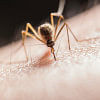

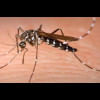
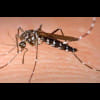


Comments